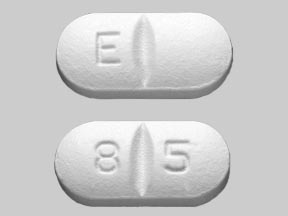Penicillin V potassium
Generic name: penicillin V potassium (oral) [ PEN-i-SIL-in-V-poe-TAS-ee-um ]
Dosage forms: oral powder for reconstitution (125 mg/5 mL; 250 mg/5 mL), oral tablet (250 mg; 500 mg)
Drug class: Natural penicillins
What is penicillin V potassium?
Penicillin V potassium is a slow-onset antibiotic that is used to treat many types of mild to moderate infections caused by bacteria, including scarlet fever, pneumonia, skin infections, and infections affecting the nose, mouth, or throat. Penicillin V potassium is also used to prevent the symptoms of rheumatic fever.
Penicillin V potassium is also used to prevent infections of the heart valves in people with certain heart conditions who need to have dental work or surgery.
Penicillin V potassium may also be used for purposes not listed in this medication guide.
Penicillin V potassium side effects
Get emergency medical help if you have signs of an allergic reaction: hives; fever, chills, joint pain; difficult breathing; swelling of your face, lips, tongue, or throat.
Penicillin V potassium may cause serious side effects. Call your doctor at once if you have:
-
severe stomach pain, diarrhea that is watery or bloody (even if it occurs months after your last dose);
-
easy bruising or bleeding;
-
pale or yellowed skin, dark colored urine;
-
numbness, tingling, or burning pain;
-
urination problems; or
-
fever, swollen glands, itching, joint pain, or not feeling well.
Common side effects of penicillin V potassium may include:
-
nausea, vomiting, upset stomach;
-
diarrhea;
-
swollen, black, or "hairy" tongue;
-
rash; or
-
vaginal itching or discharge.
This is not a complete list of side effects and others may occur. Call your doctor for medical advice about side effects. You may report side effects to FDA at 1-800-FDA-1088.
Related/similar drugs
Warnings
You should not be treated with penicillin V potassium if you are allergic to penicillin.
Before taking this medicine
You should not be treated with this medicine if you are allergic to penicillin.
Tell your doctor if you have ever had:
-
an allergic reaction to a cephalosporin antibiotic (Keflex, Omnicef, and others);
-
any type of allergy;
-
asthma or breathing problems;
-
a stomach or intestinal disorder;
-
heart disease; or
-
kidney disease.
If you have stomach problems or are sick with severe vomiting or diarrhea, your medication may not be as effective.
Penicillin V potassium oral liquid may contain phenylalanine. Tell your doctor if you have phenylketonuria (PKU).
Tell your doctor if you are pregnant or breastfeeding.
Do not give this medicine to a child without medical advice.
How should I take penicillin V potassium?
Follow all directions on your prescription label and read all medication guides or instruction sheets. Use the medicine exactly as directed.
You may take penicillin V potassium with or without food.
Shake the oral liquid before you measure a dose. Use the dosing syringe provided, or use a medicine dose-measuring device (not a kitchen spoon).
When given before surgery or dental work, penicillin V potassium is usually taken 1 hour before and 6 hours after the procedure. Follow your doctor's dosing instructions very carefully.
Use penicillin V potassium for the full prescribed length of time, even if your symptoms quickly improve. Skipping doses can increase your risk of infection that is resistant to medication. Penicillin V potassium will not treat a viral infection such as the flu or a common cold.
After you have finished all doses, your doctor may want to do tests to make sure your infection has completely cleared up.
Store the tablets at room temperature away from moisture, heat, and light.
Store the liquid in a refrigerator. Do not freeze. Throw away any unused liquid after 14 days.
What happens if I miss a dose?
Take the medicine as soon as you can, but skip the missed dose if it is almost time for your next dose. Do not take two doses at one time.
What happens if I overdose?
Seek emergency medical attention or call the Poison Help line at 1-800-222-1222.
What should I avoid while taking penicillin V potassium?
Do not share penicillin V potassium with another person, even if they have the same symptoms you have.
Antibiotic medicines can cause diarrhea, which may be a sign of a new infection. If you have diarrhea that is watery or bloody, call your doctor before using anti-diarrhea medicine.
What other drugs will affect penicillin V potassium?
Penicillin V potassium can make birth control pills less effective. Ask your doctor about using a non-hormonal birth control (condom, diaphragm with spermicide) to prevent pregnancy.
Other drugs may affect penicillin V potassium, including prescription and over-the-counter medicines, vitamins, and herbal products. Tell your doctor about all your current medicines and any medicine you start or stop using.
More about penicillin v potassium
- Check interactions
- Compare alternatives
- Pricing & coupons
- Reviews (56)
- Drug images
- Side effects
- Dosage information
- During pregnancy
- Drug class: natural penicillins
- Breastfeeding
- En español
Patient resources
Other brands
Professional resources
Other brands
Related treatment guides
Further information
Remember, keep this and all other medicines out of the reach of children, never share your medicines with others, and use this medication only for the indication prescribed.
Always consult your healthcare provider to ensure the information displayed on this page applies to your personal circumstances.
Copyright 1996-2025 Cerner Multum, Inc. Version: 2.01.

